At first glance, the deeply Catholic Philippines can seem surprisingly LGBT-friendly. In a nation of 110 million people, more than 110,000 showed up last week to Quezon City’s Pride festival, making it by far the largest LGBT congregation in Southeast Asia. The country also ranks highest in the region for LGBT social acceptance—according to a 2021 global index—and it’s made significant strides over the years toward greater inclusivity and equality.
And yet, for more than two decades, a bill that would criminalize discrimination based on one’s sexual orientation, gender identity, gender expression, or sex characteristics (SOGIESC) has languished in the Philippines’ Congress. Year after year, it’s practically become an annual tradition for legislation on the matter to be reintroduced and rejected, leaving LGBT people in many parts of the country with no legal recourse when they’re discriminated against.
Read more: A Year After Singapore Decriminalized Gay Sex, Its LGBT Community Turns Attention to Family
While many cities across the country have already instituted local ordinances to make SOGIESC-based discrimination illegal, Irish Inoceto, a Filipino LGBT activist and former employee of the Philippine Supreme Court, tells TIME that they have “no teeth at all” and that she has seen firsthand just how overdue and glaringly necessary such a nationwide law is.
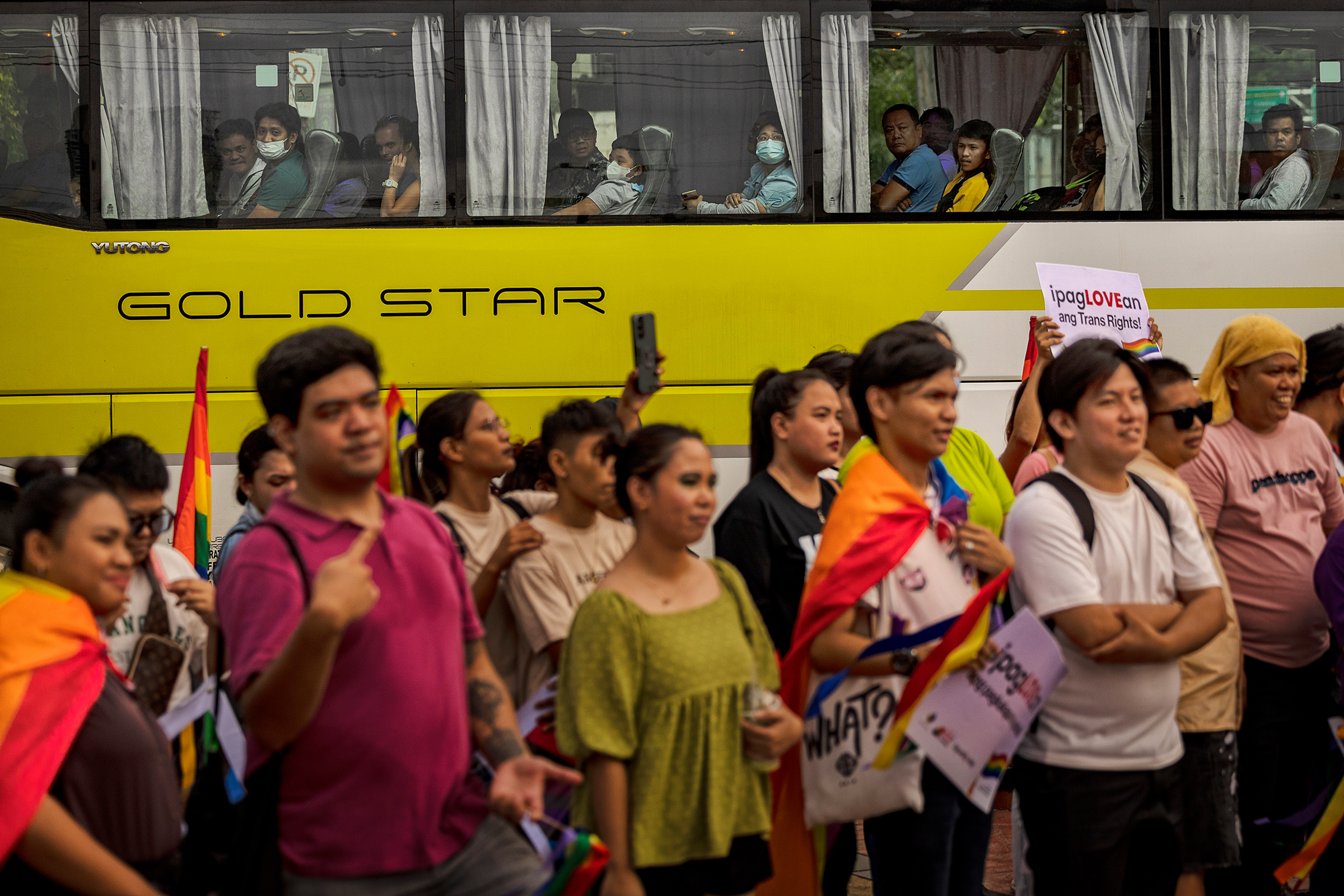
Last October, Inoceto received a message on Facebook from an 11th grader just weeks before students were to be required back in classrooms after two years of COVID-prompted remote learning. The student, a transgender woman in Iloilo City, some 280 miles southeast of Manila, had met Inoceto through one of the routine LGBT rights seminars Inoceto facilitated across Iloilo City, where she used to be based. The student, who had attended some classes in person during a hybrid-remote period, told Inoceto that the school principal summoned her personally to say that men should not wear bras; she also said a school security officer policed her uniform. Meanwhile, another student at the same school who also identifies as a transgender woman similarly reached out to Inoceto to tell her that the principal rounded up all the students in her grade and declared that bakla (gay men) with long hair must cut it or be barred from school.
“The length of my hair is not the basis for my schooling,” the latter student, who is now 19 and requested anonymity for fear of further discrimination, tells TIME.
The situation prompted Inoceto to write to the school on both students’ behalfs. She cited Iloilo City’s own anti-discrimination ordinance that passed in 2018, but she says her letter was ignored. Only after visiting the principal in person did Inoceto ultimately prevail in getting the school to back down on its attempts to curb both students’ gender expression. Any relief for Inoceto, however, was short-lived. The ordeal thrust her into the national spotlight and set in motion a saga that would ultimately force her to flee the country, where she continues to advocate for the national anti-discrimination bill to be passed.
Inoceto, who is now 46 years old, has spent half her life watching Philippine legislators fail to create a national anti-discrimination law for the LGBT community. Legislative records show the first version of what would later come to be known as the SOGIE Equality Bill was filed in the Philippine House of Representatives on Jan. 26, 2000. Successive Congresses have seen the bill progress through the legislative process to varying degrees, only to meet the same fate: at best, the entire lower chamber might approve it, only for the upper chamber—the Philippine Senate—to let it stall in deliberations.
The most recent version of the bill in the Senate would outlaw SOGIESC-based discriminatory practices like refusing admission to or expelling a person from schools, or imposing harsher than normal disciplinary sanctions on students. If passed, violators may pay a fine as high as 250,000 Philippine pesos ($4,535) or be jailed for as long as six years.
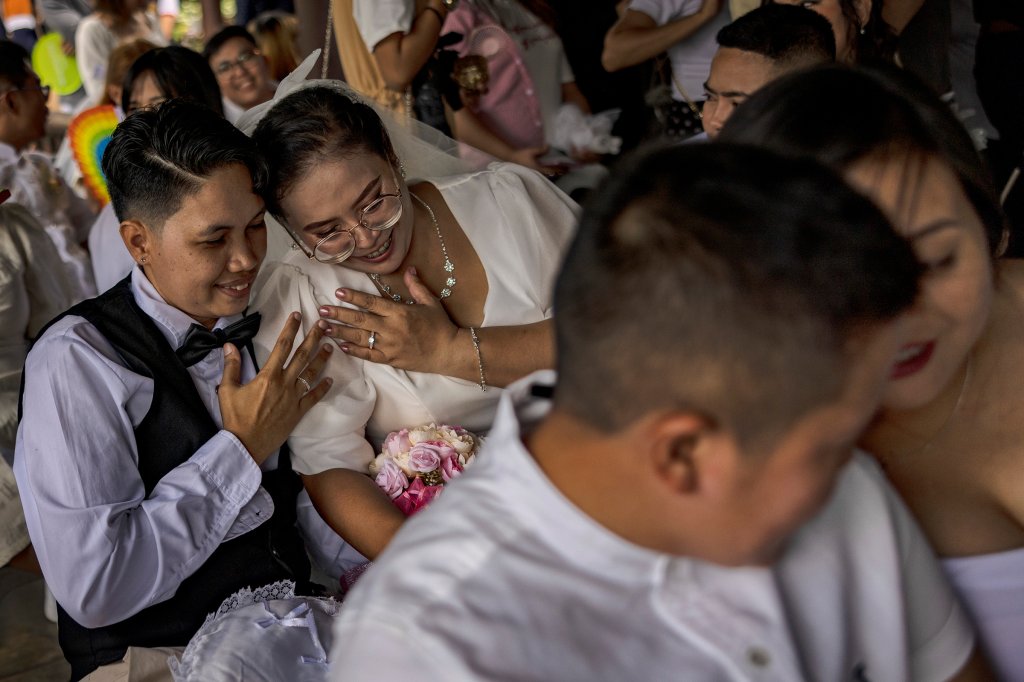
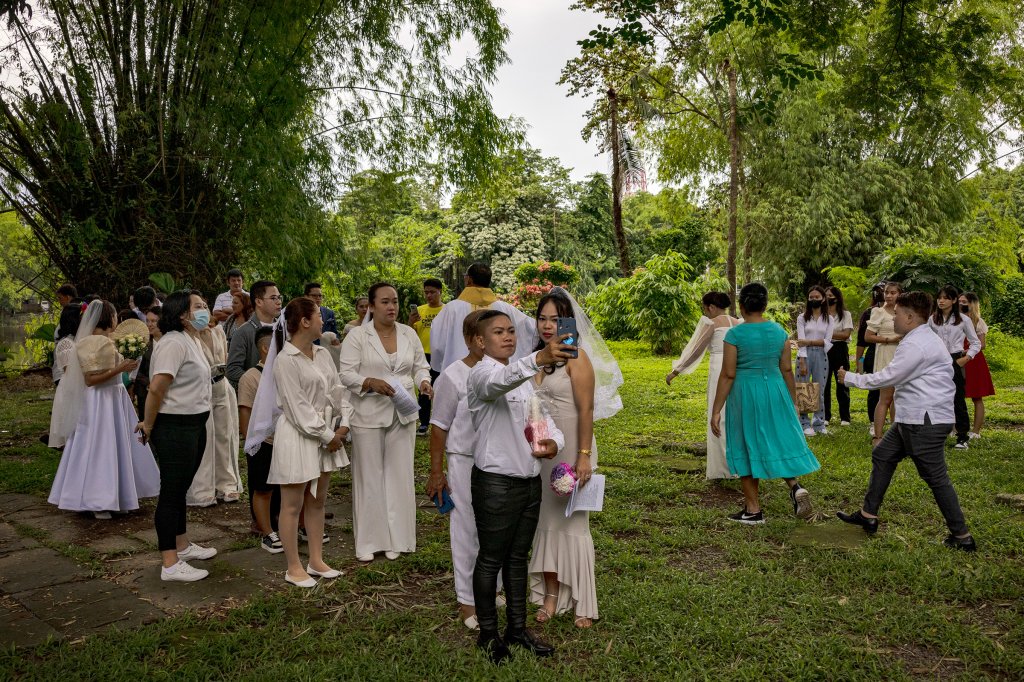
But the bill faces steep political resistance, particularly from Christian fundamentalists who, despite constituting a minority of the population compared to the Philippine’s overwhelming Catholic majority, represent a potent political force in the country: megachurches have galvanized fiercely loyal followings and fostered political power through electoral endorsements and the fielding of their own candidates.
Read more: In the Philippines, You Can Be Both Openly LGBT and Proudly Catholic. But It’s Not Easy
Opponents of the SOGIE Equality Bill have been accused of promulgating disinformation online as well as in the halls of Congress to obstruct its passage.
Two of the most vocal figures in the legislative efforts to block the bill are father and son duo Eddie and Joel Villanueva—a representative and senator, respectively. The elder Villanueva, who is also the founder of the Jesus is Lord megachurch, has describe the bill as “imported,” saying it doesn’t represent Filipino values, while the younger Villanueva has accused the bill of being a precursor to “same-sex marriage.”
Reyna Valmores, chair of the Philippine LGBT rights group Bahaghari, has attended deliberations of the bill in the Philippine House as a resource person. She tells TIME the hearings can often feel like a “circus” of disinformation. “We have elected officials talking about how the SOGIE Equality Bill is going to legalize bestiality, is going to legalize having sex robots, and some other such nonsense.”
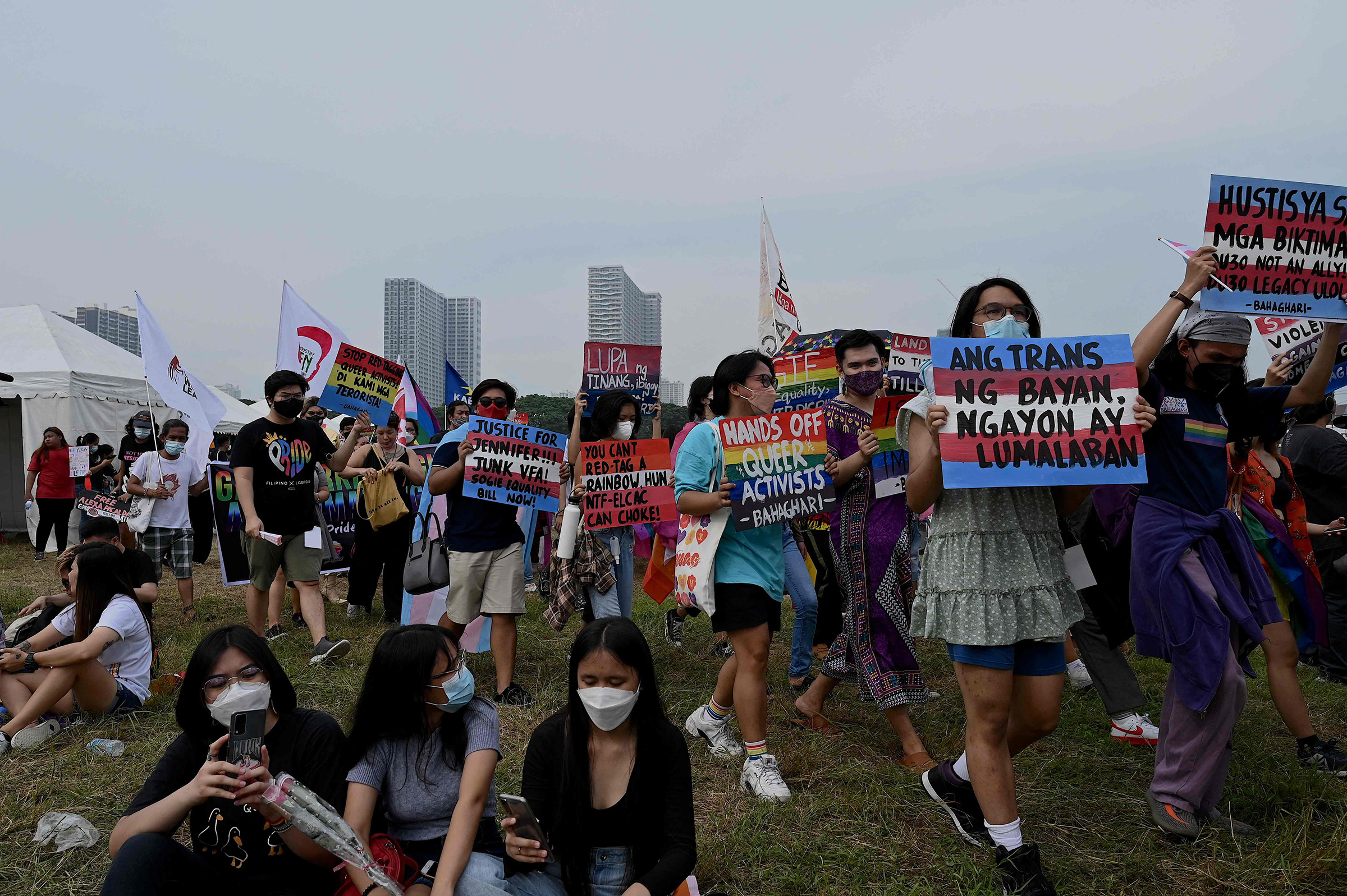
“It’s a matter of debates in Congress,” Valmores says. “But for many people, it’s a matter of survival.”
Soon after helping the two students in Iloilo City, Inoceto began to be targeted at a national scale—highlighting some of the extreme measures taken by prominent opponents of LGBT advocacy in the country.
Her name appeared in broadcasts from the Sonshine Media Network International, a television station owned by Apollo Quiboloy—a Philippine megachurch leader who is on the FBI’s most-wanted list for charges of sex trafficking women and children. Two anchors of a show on the network, Lorraine Badoy and Jeffrey “Ka Eric” Celiz, claimed that Inoceto was a member of the local communist insurgency group and has been using LGBT issues—such as her opposition to the gendered haircut policy—to recruit students from the Iloilo school. (TIME spoke to multiple students who denied that they had been recruited by Inoceto in any way.)
The sudden attention was confusing and frightening: “I’m an activist, but I’m not a big-time activist,” Inoceto tells TIME. “I work after hours and on weekends on my advocacy. So I was like, ‘Why me? And why issues on trans women students?’”
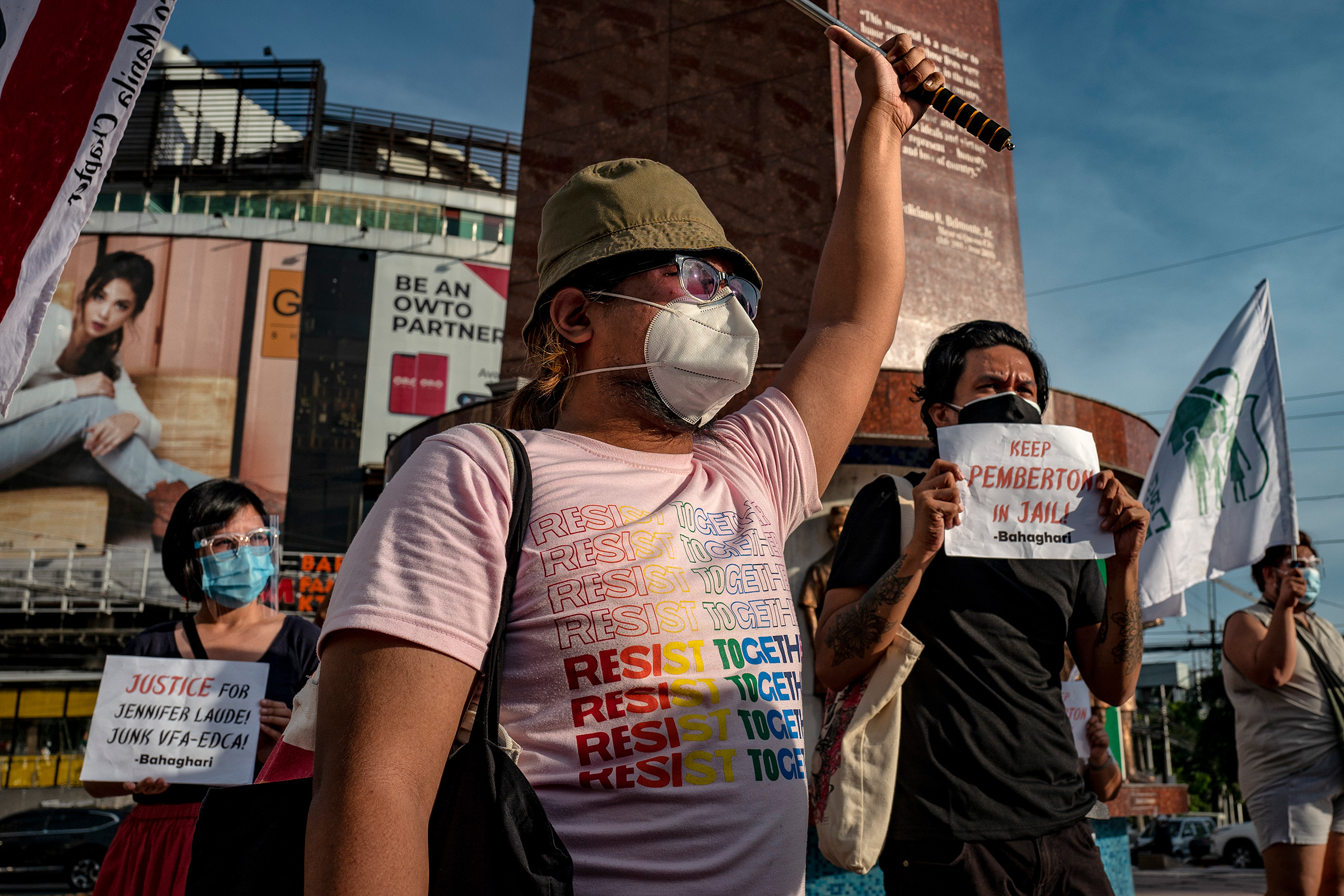
Red-tagging—a McCarthyism-like tactic of falsely labeling people as communists historically used in the Philippines to silence critics of the government, which has sometimes even led to victims being killed—has more and more been used against LGBT advocates in recent years. (Valmores from Bahaghari has also been red-tagged.)
After the broadcast, the country’s Commission on Human Rights issued a statement expressing concern over the anchors’ remarks, adding that the narrative they used “only serves to perpetuate the already disadvantageous plight of the LGBT who frequently face stigma, discrimination, and gender-based violence in our society.”
But that wasn’t the end of it. Inoceto saw her face posted across tarpaulins in the city, and her identity spread on social media. She even says her mother was visited by people who claimed to be police officers, asking her to stop her LGBT activism.
Concerned over the risks to her and her family’s safety, Inoceto says she applied for political asylum in France, where she is currently staying. She’s convinced that if the SOGIE Equality Bill had already been passed, she would have been protected from her harassment. “Right out the bat I was discriminated [against] because I was working towards inclusion,” she says.
Still, despite all the obstacles and dangerous disinformation wielded against the LGBT movement, Inoceto remains hopeful that the anti-discrimination bill in the Philippines will eventually pass—but not without sustained pressure put on the groups that are standing in its way. “Rights are fought for and won after so much struggle after all,” she says. “We just need to be stronger. In the meantime, we keep fighting the good fight.”
More Must-Reads From TIME
- The 100 Most Influential People of 2024
- Coco Gauff Is Playing for Herself Now
- Scenes From Pro-Palestinian Encampments Across U.S. Universities
- 6 Compliments That Land Every Time
- If You're Dating Right Now , You're Brave: Column
- The AI That Could Heal a Divided Internet
- Fallout Is a Brilliant Model for the Future of Video Game Adaptations
- Want Weekly Recs on What to Watch, Read, and More? Sign Up for Worth Your Time
Contact us at letters@time.com
